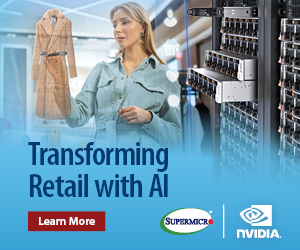MACH X 2025: From Hype to High-Velocity Execution
DingDong Fresh and Gymshark show how composable AI turns retail theory into execution, reports Miya Knights, Retail Technology Publisher
At MACH X 2025, leaders from two data-driven retailers—China's DingDong Fresh and the UK's Gymshark—shared how they're scaling artificial intelligence (AI) and composable architecture from experiment to execution.
Both emphasised that success depends less on the AI tools themselves than on business integration, agility, and data discipline; a key insight that echoed much of the prevailing sentiment at the event, which gathered business executives and technologists in London this week.
The event was hosted by nonprofit tech advocacy organisation, the MACH Alliance, to explore the impact of AI on its composable enterprise software principles, which requires a microservices, application programming interface (API)-first, cloud-native, and headless (MACH) approach to IT architecture.
Real-world AI applications
Shaoming Yang, Vice President at China's quick-ecommerce giant, DingDong Fresh, outlined how the company runs a 30-minute grocery delivery network spanning over 1,000 dark stores in China's largest cities. The key, he argued, is embedding AI-driven intelligence directly into workflows rather than treating it as an innovation side-project.
"AI can't live in a lab," Yang told delegates. "It has to breathe inside the operation. Every decision—from how we stock avocados to how a courier plans their route—is driven by models running in real time."
He described how DingDong's architecture is fully composable: APIs and microservices govern core functions such as order capture, route optimisation, and fulfilment sequencing.
"When you decouple capabilities, you don't slow the business down with change," he explained. "If our data science team builds a new demand-forecasting model, we can plug it straight in without rewriting our core stack."
The result is a system that reacts instantly to fluctuations in demand, weather and traffic conditions. But Yang was equally clear that the real asset lies in machine data, not just customer data.
Actionable operational AI insight
"Everyone talks about customer insight, but operational data is where our margins live," he said. "Every pick path, every delivery delay, every out-of-stock tells a story about efficiency."
His closing message to retailers pursuing AI-enabled fulfilment was direct: "Speed doesn't come from running faster—it comes from building smarter systems that run themselves."
For Evie Thompson, Group Head of Data Engineering & AI at Gymshark, the priority is using AI to serve strategy, not the other way round.
"If you strip away the noise, AI is just a tool," she told the MACH X audience. "It gives you the how, but never the why or the what. The question every business must ask is: what impact are we trying to create?"
Brand-building with data
Thompson used an analogy from sport to illustrate the power of data-driven decision-making, recalling how footballer Kevin De Bruyne negotiated a multimillion-pound contract using performance data and predictive analytics rather than an agent.
"He effectively became his own brand through data," she said. "That's the mindset shift we need—using evidence to prove value and potential, whether you're an athlete or a retailer."
At Gymshark, that translates into business-aligned AI use cases—from dynamic product recommendations to demand forecasting for size curves and global fulfilment. Yet Thompson admitted that the company's rapid growth had created technical debt that had to be paid down before AI could scale.
"We went from a start-up to a scale-up so fast that some foundations just weren't there," she said. "The data wasn't in the best shape possible, and our infrastructure needed rebuilding. You can't bolt AI onto shaky plumbing."
Establishing data integrity
Her team's first task was to build a cloud-native data platform that combined a lake-and-warehouse model to support trustworthy data pipelines. "The boring stuff matters most," she noted. "If your engineers spend 80% of their time fixing data quality, they'll never deliver value."
Thompson also highlighted the importance of AI governance and continuous model monitoring. "Once models are in production, the work starts, not ends," she said. "You need scorecards, drift detection, retraining pipelines—and a shared understanding between data scientists, compliance and business owners."
As for the human factor, Gymshark is embedding cross-functional 'pods' of engineers, product owners and data scientists to accelerate experimentation.
"Technology alone doesn't transform you," she concluded. "It's people, process and persistence that make AI stick."
Three lessons for retail technology leaders
Both Yang and Thompson spoke from different retail contexts—ultra-fast grocery versus lifestyle e-commerce—but their playbooks converged around three clear imperatives for the MACH community:
-
Architect for composability and change.
Whether optimising a dark-store network or a global commerce stack, modularity is the precondition for agility. Decoupled services let teams upgrade capabilities without disrupting operations. -
Operationalise AI across the value chain.
Embed intelligence into fulfilment, merchandising, marketing and customer service so models continuously learn from live data streams—not isolated test sets. -
Invest in governance, data foundations and people.
Trustworthy data, transparent model management and multi-disciplinary teams are the real accelerators of sustainable AI adoption.
As the MACH X 2025 theme, "Creating the AI-Ready Enterprise," suggests, the AI frontier is no longer about experimentation but execution. DingDong Fresh demonstrates the operational edge of composability at scale, while Gymshark shows how cultural and technical readiness determine whether AI delivers value or vanity.
Both leaders left the audience with the same challenge: stop asking what AI can do for retail—and start redesigning retail so AI can do it.





